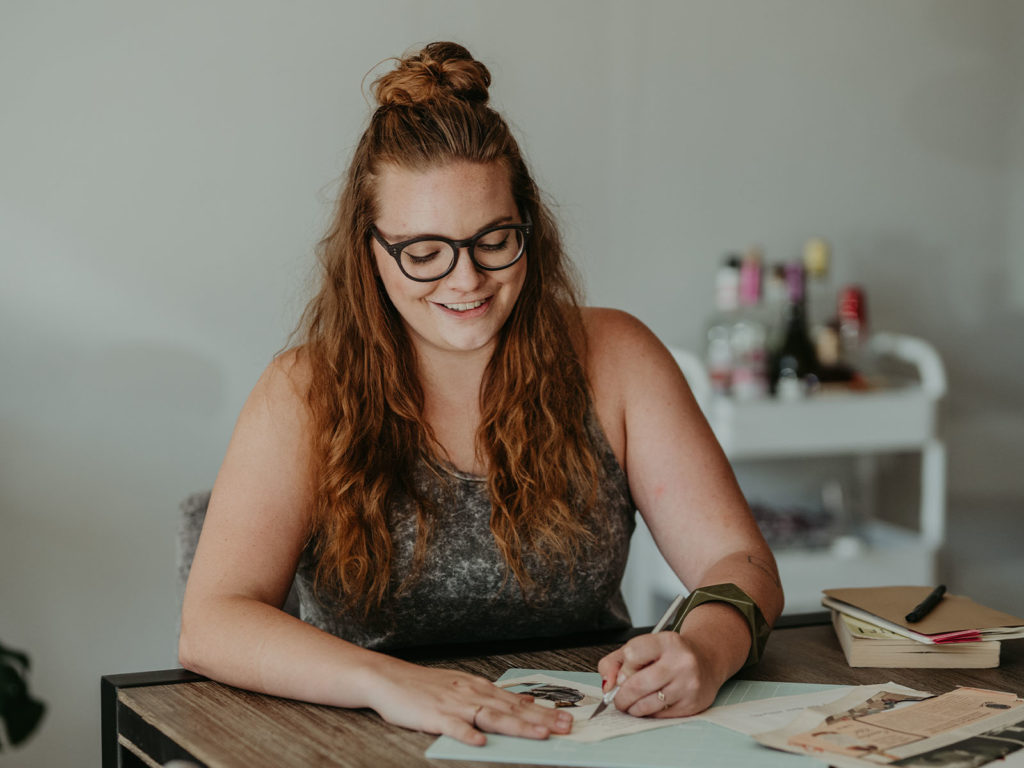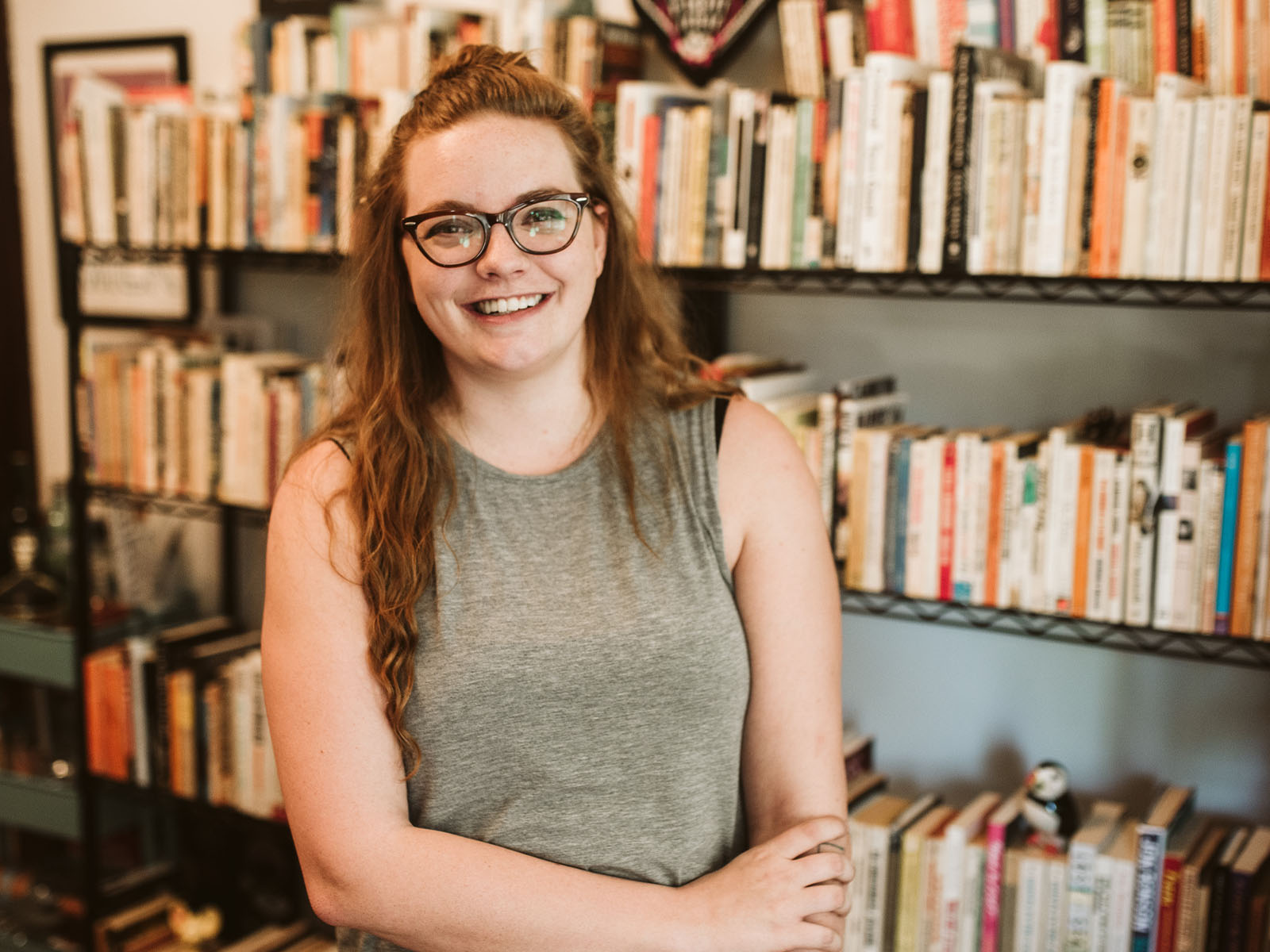Kayla Schmidt is currently serving as the executive director of the North Dakota Women’s Network. She’s worn many hats, including working at a balloon shop, but a mental health diagnosis has been especially helpful in her work. Schmidt talks to Ladyboss about women’s health, taking an unconventional path and the importance of getting involved in your community.
Tell me a little about yourself.
I was raised in Minot. My mom grew up on a farm in Wilton and my dad is from Minot. We grew up in the house that his parents built, so we are very North Dakotan. I went to Minot State (go Beavers!) because I always liked to write and figured what to do with that would come to me while I studied, but I’m still working on that. While I was there studying English, I happened to walk past the study abroad office and decided to try that. I had a great time but came back to North Dakota to finish my undergrad. I’ve had every job under the sun from video store clerk to working at a balloon store and working at a bank.
Eventually, I decided to go back to school and went to grad school in England, once again, and got my master’s in creative nonfiction and biography writing. That really helped me hone my skills in telling stories and portraying real life in a way that’s interesting. I discovered a lot of people haven’t really heard of that Midwestern experience. It gave me the inspiration to come back to North Dakota and tell those stories. Now I’m really involved in social justice movements; I started the freelance thing and help nonprofits do their social media and newsletters. Last month, the North Dakota Women’s Network needed an interim executive director, so I’ve been doing that along with my own creative stuff.

Advocates for Women, By Women
With the support of our growing member base, we work to improve the lives of women in North Dakota through education, advocacy and activism. Our core areas of focus speak to our values of leadership, opportunity and equality for all.
That’s quite the path. Your days must be really interesting.
When I turned 30, I discovered that I have ADHD. Throughout my whole life, I’ve realized that I get really passionate about something and then just roll on to the next thing. I realized it’s because my brain really craves novelty. I’ve been trying to do that for myself and encourage other people to follow what their brain wants. When I was doing those bank jobs, I was like climbing the walls, I felt so bored. So now, day-to-day, I keep it varied. Right now, I’m doing the executive director thing. With the legislative session coming up, the North Dakota Women’s Network is really encouraging women to get involved civically, run for office and get to know their representatives. We’re doing workshops and then I’m working on my personal projects. I’m writing a memoir about teeth and I have clients who need newsletters or other things written. It works for me now that I understand my neurodivergent pathways.
You mentioned you found out later in life you have ADHD. It seems like a lot of women are getting these diagnoses later in life because it’s something we don’t look for in women. Can you talk to me a bit about your experience getting the diagnosis and how it’s affected your professional life?
I went to grade school in the ‘90s, and ADHD was just a thing for hyperactive boys, whereas I was the opposite. I was very internal and quiet. Now I know that’s because I had so many thoughts going on. I had no idea I had it. I figured it was just anxiety. I was diagnosed with anxiety and seasonal depression, being in North Dakota. Once I had enough contracts going and could afford to take care of my mental health, which is one of the tough things about freelancing— some of those important things fall by the wayside until you can take care of them—but I was discussing how I felt like so many things had passed me by.
I felt like I was a meteor of potential but was never able to make any impact. My therapist asked if I’d looked into ADHD and I burst into tears. We just weren’t looking for the symptoms in women. Women are better at fitting the societal mold, being polite and quiet. I was getting A’s even though it took me so long to get my homework done or to do standardized tests. My mom was a teacher and it never even occurred to her because no one was talking about girls and women having ADHD.
Professionally, it’s hard. I tried to fit into that box of what I thought I should be professionally for almost three decades and it just doesn’t work for me. I think during the pandemic, once schedules and such were lost, a lot of women started to realize those structures had been keeping them from diagnoses. Having those answers, I don’t think, makes it easier, but it does allow me to find my community.
Has getting a diagnosis helped you understand how to be more productive in your own way rather than trying to conform to this type of workday that just doesn’t work for you?
I used to be so hard on myself. Like, I’ll leave the dishes for a while and now I know that dirty dishes don’t have any effect on the value of me as a person. I worked at this office for a while where they were wonderfully creative people but very minimalist and I needed everything scattered on my desk. It looks disorganized, but it’s how I function. In the Midwest, being open about your mental diagnosis can be taboo, but I’m open about it so I can communicate how I work best.
You’re the executive director of the North Dakota Women’s Network. Tell me more about how you got involved in that kind of work.
When I was an undergrad, I had an internship with Planned Parenthood, and they were partnering with the North Dakota Women’s Network to put together these casual conversations called Feminist First Friday. We’d meet at a restaurant and discuss the topics of the day, like fundraising for menstrual products or talking about legislative measures. I was pretty shy, but it was something I felt strongly about. I grew up in a really matriarchal environment. What we were going through wasn’t what our grandmothers went through, but I saw there were still so many injustices.
When I came back from grad school, I started working in Bismarck and started going to Feminist Fridays there. They provide a class called We Rise, which is a training and a day at the capitol. I was getting interested and involved in politics and at We Rise, they do “legislation 101.” As reproductive health has gotten bigger, I started going to a lot of rallies, which sometimes in North Dakota can be like 12 people, but they’re the most passionate and brave 12 people you’ve ever met. The Women’s Network will testify on all kinds of different bills, and we are giving a voice to those in our community who typically don’t have one.
Support North Dakota Women’s Network
Phone: (701) 712-9600
Web: ndwomen.org
Email: [email protected]
Facebook: @NDWomensNetwork
Instagram: @NDWomensNetwork
Address: 1929 N Washington St Suite W Bismarck, ND 58501

